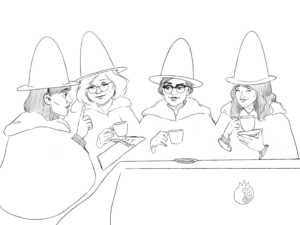If I were cryogenically frozen now and awakened in several thousand years, I’d be secretly hoping to wake up in something like Becky Chambers’s Wayfarers universe.
This series is a rare gem within the sci-fi genre, both for its depiction of a largely hopeful future for humanity (if not the Earth itself) and its focus on relatively “average” individuals living out their daily lives within their vibrant and fascinating galaxy. Rather than centering on a single hero’s journey, or building up to an explosive battle scene, these books offer something wonderfully refreshing: quiet stories about people (human and alien) and the ways they connect with one another throughout the cosmos.
The third and newest installment in the ongoing series, Record of a Spaceborn Few, focuses on a human space-faring colony—descendants of those who fled their doomed planet several generations ago. Their world unfolds through the perspectives of multiple inhabitants, including an archivist (read: space librarian!!!), a mother uncertain about her family’s future, a teenager who longs for adventure, a professional funerary caretaker, and even a visiting alien scholar. The result of these combined viewpoints is a genuine-feeling society with a rich history that will stay with you long after you’ve turned the last page.
Of course, for all my praise, this universe is far from being a sugar-coated paradise—in Spaceborn, there’s a catastrophe that sends waves through the human community for years, and in both of the preceding novels, readers get glimpses of less-than-compassionate alien races. And this is a strong point: While the Wayfarers stories are often hopeful and cozy, they’re also gritty and deeply realistic—and Chambers’ writing pulls you in, making it impossible not to imagine living in her brilliantly crafted universe.
Via an email interview, I had the opportunity to ask Chambers a few questions about her work and plans for the future:
Alicia Kania: To start out, I have to say that the world you’ve created in your Wayfarers series has become my favorite version of The Future. It feels so realistic, yet so hopeful … and delightfully nerdy. How much of your approach to world-building involves imagining a future that you find exciting/appealing?
Becky Chambers: Oh, that’s a huge part of it. I want to create futures that the reader can easily connect to — places that are comfy to hang out in for a while, and maybe even appealing to imagine a whole life within. The easiest way to do that is to create places that I want to live in as well! There’s a selfish aspect there, of course. With as much time as I spend with these books, it’d be a slog if I hated the places I cooked up. But that’s not to say that every place within the Galactic Commons is a picnic. Pepper’s home planet in A Closed and Common Orbit, for example, is a straight-up horrorshow, and I wouldn’t want to be within a lightyear from there. But it’s also way outside the realm of what mainstream cultures would find acceptable. So while this universe is not utopian, and it’s definitely not perfect, and very scary places and people still exist, the core of this setting is, I believe, something welcoming. And that’s key for me. It’s why I have so much fun writing it.
AK: One thing I kept geeking out about while reading Record of a Spaceborn Few was the level of detail we get about aspects of the human space colony that are often left out of sci-fi: Things like the process of recycling, the customs for funerals and record-keeping, what people do for entertainment, and how a human/alien cultural information exchange might work. Is incorporating these elements a natural part of your writing process, or do you set out to “fill in the gaps,” so to speak? (Or maybe a little of both?)
BC: That little stuff is what really gets my engine running. I can’t imagine not asking those questions when I write a new place. The intent with this series is to create a space opera-esque future that feels accessible and relatable to the everyday people reading it. I want to shift the focus away from the big movers and shakers — your rebel heroes and chosen ones and whatnot — and instead focus on ordinary workers and families. A galactic future for the ninety-nine percent, if you will. So given that, it follows pretty naturally that the details I spend perhaps the most time working out are things like where your food comes from, what you do with your trash, where you sleep, what you do for fun, what stories you tell, and so on. Things like that are at the absolute heart of any culture. They tell you so much about who people are and what they value.
AK: Each book in this series is a spin-off from the previous title, with different central characters and a new setting. With each new title, how have you determined where to shift the focus? And how much has your writing process differed from one book to the next?
BC: This is going to be a fluffy answer, but when it comes to choosing focus, I just go with my gut. I have no idea where I’m off to next until I’ve put my metaphorical pen down on the prior manuscript. Every time, there’s been one particular hook that seemed like the obvious direction to head in.
As far as process goes, I learn something new with each book. The Long Way to a Small, Angry Planet was a super scattered process, as I think all first novels are. I had no idea what I was doing. A Closed and Common Orbit was done much faster and in a more focused way, but I was stressed out of my mind (it was my first time writing fiction on deadline). Spaceborn Few was challenging due to its structure —multiple POVs I was comfy with, but these folks are largely not in each other’s lives aside from key moments — but I was more in tune with how I like to work and how to get things done. The process felt familiar by that point, and more honed. My brain’s like, “ah, yes, we’re writing a book, I remember how this goes.”
AK: Since future installments in this series are planned(!), I have to ask: How soon can we expect another Wayfarers adventure? And where might this ongoing exploration of this wonderful universe take readers next?
BC: I’ve taken a break from Wayfarers since I finished Spaceborn Few early this year. I’ve been doing some other smaller projects, and I needed a bit of a palate cleanse. I plan to start writing the next Wayfarers book in March or April. I don’t know when it’ll be done, but it won’t be too long of a wait. As far as where we’re headed next, all I’ll say for right now is that it’s going to be super, super alien. I think that’s only fair after focusing on humans for a while.
AK: In Spaceborn, we get more details about the fascinating histories of both the human and Harmagian societies than ever before—and much of this info shows up within short essays written by an alien scholar. How do you determine how much of that cultural background to feature within the story?
BC: That’s always a tricky call to make. I have way more cultural tidbits and old histories written than I’ll ever be able to use, and killing those darlings is hard. I don’t have a hard or fast rule for how I decide what to keep and what to set aside. I keep the structure of things very flexible until the book starts to coalesce. I write all these separate pieces, I cobble them together, and I keep shuffling things around until the balance feels right. That could mean reading it aloud a few times and hearing the rhythm of it, or setting a chapter aside for a week and coming back to it with fresh eyes. If a bit of history doesn’t fit or is making things drag, out it goes. But the flip side of that is understanding that not everything has to have a point. Cultural flavor for cultural flavor’s sake is entirely valid. That’s the kind of stuff I like to read, so it’s the kind of stuff I like to write, too.
AK: I sometimes refer to this series as “quiet sci-fi,” since the characters don’t lean into the “larger than life” or “hero’s journey” tropes common for the genre—instead, they’re more like real people (from many different species), only in the distant future. What is your process for creating so many unique and well-rounded characters in this fantastical sci-fi setting?
BC: I talk to folks. I people watch. I make notes on conversations I have and things I overhear. Sometimes if I’m on a plane or a bus, I’ll put away my phone and take out my headphones and just listen to what’s going on around me. I never know where a character’s going to come from, so I make myself open to everything. Kizzy is lifted wholesale from a friend I had in college. Pei came from a conversation I had with a random customer while bartending, three years before I wrote her. Isabel and Tamsin are an amalgamation of elderly friends and a future I personally needed to see. I took Sawyer’s name from an employee’s nametag at Jamba Juice. I have no idea where Pepper and Blue came from. Dr. Chef was just me having fun. Like all storytelling, making characters is akin to fixing dinner out of whatever leftovers you have in the fridge.
AK: Finally, I was excited to see the recent announcement about your upcoming solarpunk novellas with Tor! I loved that the Wayfarers series had several wonderful solarpunk details (such as an emphasis on the importance of plants, renewable energy, and reuse of materials). What inspired you to pivot into a full solarpunk setting for the new novellas?
BC: Well, for starters, solarpunk rules. The artwork and aesthetic touchstones of the genre tickle my brain like few other things. It makes me feel hopeful and inspired and fired up, which is a good way to feel in the face of the rather dystopian slant the real-world news has these days. I look at illustrations or models of green futuristic cities, and I go, yes, that. I want to tell a story about that. It really speaks to me. I love environmental science and technological progress in equal measure, and I see solarpunk as the place where they exist in harmony, as opposed to the common narrative of them being nemeses. You’re right, I’ve got touches of that stuff in Wayfarers, but I really wanted an opportunity to throw myself into those ideas completely. When Tor.com approached me about writing for them, I knew that was the way to go. And while I’m passionate as ever about space, I’ve had a strong itch lately to branch out into more terrestrial storytelling, too. So over the next couple years, I’ll be writing both side by side. I can be polyamorous about genres, right?
For more info on Becky Chambers and her books, check out her personal website.
Featured image source: Pixabay.



